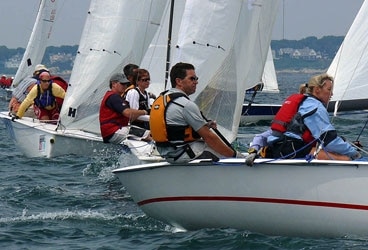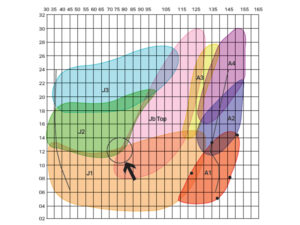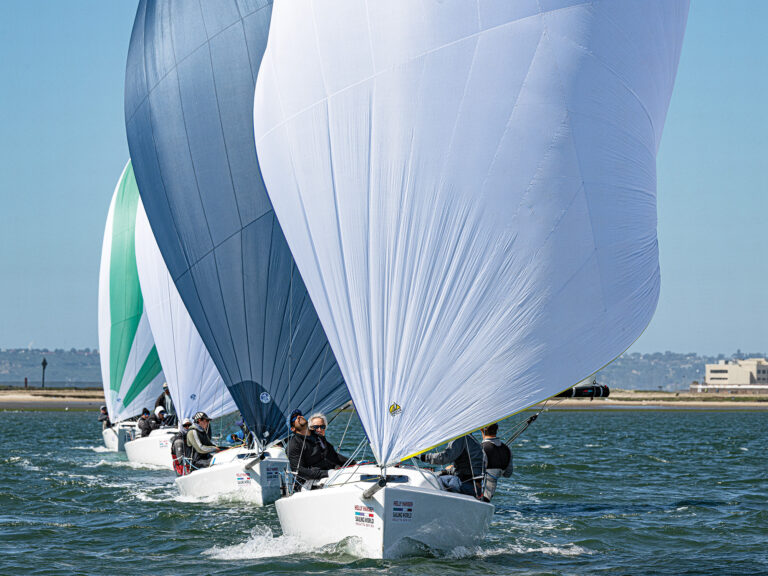
inside your head 368
The evening before the annual invitational championship Andy is tense and anxious. He is preoccupied with his fear of failing, and of revealing his fear. But the following morning on the way to the start, he is calm and at ease. He is doing what is expected of him: competing, complying with the Code of Competition, ignoring his fear, demonstrating his courage by his willingness to risk his rank and his reputation.
He starts the race enjoying his awareness of belonging to the fleet, intending to have fun, in control of himself, his crew and his opponents, and excited by the risks. He’s unaware of the possibilities of losing, of being resented, of revealing his fear and timidity. I’m going to beat these guys. I’ll control them. I’ll show them I’m in charge here! [Courage and aggressiveness]. Shortly after the start, in a slight veer, several boats to windward begin to lift away. He resents their advantage, but assumes it will be temporary. He is competing, alert to the conditions, his plan for the race, and the capability of his opponents. I have nothing to fear [courage]. I deserve to win [hubris]. His display of courage and his consciousness of hubris are reassuring.
He holds starboard in clear air until he is about two-thirds the way to the layline and then, as several of the boats to leeward tack in a slight header, he tacks to port, leading them as he had planned. But he soon becomes aware that a group of boats returning on starboard in a veer from the right corner are well ahead. He recognizes that, regardless of any shift his way, it is too late for him to make up lost ground. I should have been less cocky and not felt so confident about my chances. He feels embarrassed by his previous hubris. Well, they have been training here; they must have known that there would be a veer off that right shore [intellectualization]. They all have newer boats. I didn’t deserve to do any better [appeasement by self-punishment].
Preoccupied with his failure to have predicted the veer and his poor position, Andy rounds the first mark in 10th place and sets off down the run on starboard. He is busy hoisting his spinnaker, adjusting his sails, and escaping the dirty air produced by the crowd of nearby boats. He’s unaware that he has made no plan for the run. [He is in a fugue state induced by his shame]. Suddenly he again becomes aware of the race and looks about to find the boats that have jibed to port are in more wind, and that the leaders are surprisingly far ahead. He feels a surge of resentment and anger that distracts him. How’d they get so far ahead? I outrank them. They don’t deserve to be there, and I don’t deserve this position in this crowd in the middle of the fleet [he feels depressed, punishing himself to appease the gods].
He knows he shouldn’t feel resentful, so he quells the resentment and feels willing to accept his present position. He is ambivalent about submissiveness and aggressiveness-and now chooses submissiveness. This is where I am; I’ll just have to accept this position. I’ll go down this run quietly, avoiding any conflicts with my neighbors so that no one will notice that I am this far back. He now feels at ease, in control of the situation. This is the way I expected the race to develop [denial and intellectualization]. I’ll demonstrate my courage and my mental toughness in the way I handle this adversity [hubris].
He comes in to the leeward mark still in a semi-fugue state, preoccupied with his presumptions about the race, its outcome, and his status. He suddenly becomes aware he is on port and that several boats on starboard that rounded the weather mark astern of him may have inside overlaps. He realizes he has been unaware of these boats until now, but not wanting to recognize-or allow his crew to recognize-that he has been unaware during much of the run [he has been in and out of a fugue state], he loudly tells the inside boats, “No room!” [ambivalence switches to aggressiveness]. I’m not going to submit to these guys who ought to be astern of me [anger and aggressiveness compensate for his having been oblivious]. But he steers down on the back of a wave, slows to allow the first boat to consolidate its overlap, waves it inside [ambivalence switches to submissiveness], and shouts to the second that he should, “Keep out!” [ambivalence switches back to aggressiveness].
The helmsman of the second boat on starboard, angered by the shout to keep out, jibes and slides his bow inside in the wake of the boat ahead. Although Andy realizes this boat has probably had an overlap for the past mile, he is angered by being overtaken and ignored. He reacts by crowding him into an awkward turn close to the mark, luffs as they emerge, and comes out in clear air on his leebow. You don’t control me; I’ll show you who is the more powerful. I gave you all the room you deserved [magical thinking]. I’m the god; I’m in control. I can do as I please, regardless of the rules. The inside boat tacks away and Andy continues on port in the backwind of the first overlapped boat.
Now Andy is depressed, seething with resentment over the way in which the last two undeserving boats have caught him, and embarrassed by his aggressiveness at the mark [guilt and need to atone]. He would like to tack out of the bad air ahead, but does not want to contend with the boat that tacked. I fear his resentment. I’m not going to follow him on port into a confrontation by which he can demonstrate his resentment and possibly his superiority. He is preoccupied with his defective image, fearful that he has behaved badly, certain that his reputation has been destroyed. I feel ashamed. I hate this defective self that has embarrassed me before my peers. I deserve punishment. I’m incompetent [appeasement and depression].
He forgets all his previous successes, denies his usual competence, and assumes that at the finish all of the neighboring boats will be ahead [the dominant effect of the most recent experience]. I’m not really trying to win. I’m just out here to have fun [denial]. I feel miserable. Fate is against me [displacing the blame to a higher power]. And then: I’m tough and courageous and I can handle adversity. I’m going to get back in this race [a return to hubris].
To demonstrate he is still in control of the game, he decides to tack to starboard and escape the bad air ahead. Two-thirds of the way to the port layline, he sees the boat that he had crowded at the leeward mark approaching in position to cross him on port. Instead of tacking on his leebow, he passes astern and continues out to the layline [atonement]. Rather than confronting the helmsman he offended, he’ll atone for his misbehavior by continuing out to the layline and giving up all hope of beating him]. We’ll see what happens. There may be a big back waiting out there [magical thinking]. When I lose, it’ll be because I beat myself, not because they beat me. I’ll show them (and myself) I’m in control [hubris].
As he approaches the second weather mark, Andy sees he has dropped to about 18th. He willingly surrenders all hope of beating his usual opponents (or of finishing in the top 10 as he had hoped), accepts his position, and follows the fleet down the run. He’s disappointed, but satisfied; he feels as if he has had a pleasant day on the water. He is no longer distressed, angry, and resentful-as he was when he emerged from his confrontation at the leeward mark. I enjoy playing this game and belonging to this pack. I have been doing the right thing; I’ve been obeying the Code of Competition. He is satisfied because: 1. He has competed and by so doing has displayed his courage. 2. He, not his opponents, has determined his present position; he has controlled the game. 3. He has atoned for his misbehavior, lived up to his idealized self-image, and demonstrated he really is a “good guy.” 4. He has accepted his defeat, pleased those who have beaten him and preserved the hierarchy.
The defensive techniques described above are anti-pathetical to the competitor’s conscious purposes, are fraught with distress and work but temporarily. A little denial, a little intellectualization and a little magical thinking are reasonable enough, but one must be able to lose without needing to appease and to be aggressive and to win without needing to atone. Courage, realism, and a feeling of deservedness are what matter. “Courage is always the surest wisdom,” says Wilfred Grenville.









